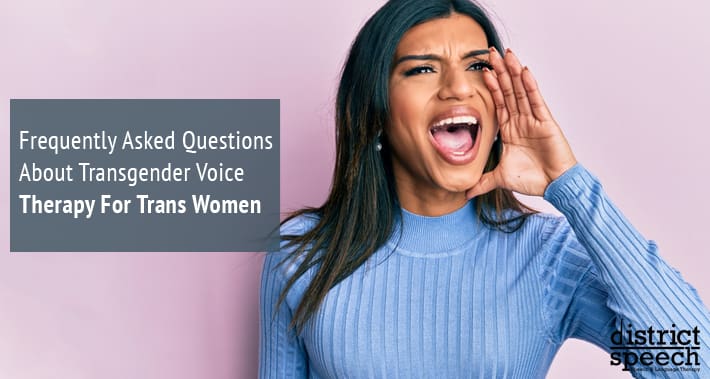
Our voices play an important role in the making of who we are.
It is through our voices that we communicate, share our thoughts, and that others can recognize us when we speak.
If you’re a transgender person, you may be struggling with feeling like your voice doesn’t reflect your gender.
Fortunately, transgender voice therapy can help.
Transgender voice therapy can help someone masculinize, feminize, or even androgynize their voice.
This can help you match your voice to your gender identity.
Let’s look at some of the most frequently asked questions about transgender voice therapy for trans women.
Can I Begin Voice Training If I Haven’t Begun Transitioning Yet?
The short answer is yes.
Transitioning is not a requirement for transgender voice therapy.
However, there are different kinds of transitioning.
Social transitioning is when you change how you present yourself to others so that it aligns with your gender identity.
This might include things like changing your name, pronouns, or changing how you dress.
It can even include changing your voice.
Medically transitioning is when you begin using medical procedures, like hormones or surgery, to transition.
Not all transgender people medically transition.
For some, it might be hard to access resources and support.
Others might simply not want to.
Neither of these kinds of transitions are necessary to begin voice feminization speech therapy.
However, it can sometimes be difficult to stay motivated to practice voice feminization exercises when you haven’t yet socially transitioned.
As well, a big part of transgender voice training is practicing the new voice you’ve found for yourself.
Your transgender voice coach can help you with techniques to feminize your voice, but essentially you’re learning to use your muscles in different ways.
As a result, practicing your new techniques is the most effective way to properly feminize your voice.
And that becomes much easier when you’re actually using it.
RELATED: Should You Listen To Recordings Of Your Voice When Doing Transgender Voice Feminization Training?
Everyone has different motivations for seeking out transgender voice therapy.
Some begin transgender voice therapy before coming out to their friends and family, in order to develop a female voice for when they do.
Others are already well into their gender social transition and seek out transgender voice therapy after transitioning.
Your speech therapist will assess your unique circumstances and needs in order to develop a therapy plan that is right for you.
Will Estrogen Hormone Therapy Affect My Voice?
Taking estrogen is part of medically transitioning for many trans women.
Estrogen causes changes to your body, like going through female puberty, that help feminize it.
For example, estrogen will cause breast development to begin, redistribute fat in your body, and slow body hair growth.
Unfortunately, estrogen hormone therapy has no significant impact on your voice.
When you go through testosterone driven puberty, it causes your larynx to lower, and your vocal folds to thicken and lengthen.
As nice as it would be, estrogen does not reverse this process.
Interestingly, though, testosterone has this effect whether it’s your first or second puberty.
As a result, trans men end up with deeper voices naturally.
Speech therapy for trans men and trans masculine folks, as a result, has a different approach than for trans women and trans femmes.
How Long Will It Take To Feminize My Voice?
Everyone’s progress will look different.
Your progress in transgender voice therapy will depend on a variety of factors.
These include your ability to commit to therapy, motivation to improve, and your personal circumstances and skills.
Your progress can also depend on the skill and experience of your language therapist.
The general guide suggests that it takes approximately 12 sessions to feminize a voice.
Like all therapy, this process will be broken down into steps with stages of development.
Will I Need Voice Feminization Surgery?
Voice feminization surgery is another method of medical transition.
But will you need it?
Not necessarily.
The majority of individuals who seek out transgender voice therapy are able to achieve a feminized voice without the need for surgery.
When voice feminization surgery is performed, it is done so to elevate pitch.
In simple terms, elevating your pitch makes your voice higher.
While voice pitch is an important factor in the distinction of male versus female voices, it is only one factor.
Many other factors, such as resonance, speech patterns, weight, and more, are equally important in feminizing your voice.
For example, resonance is the quality of sound your voice makes.
Your voice can resonate from different places: your mouth, chest, and head are a couple of those.
Your chest is often associated with darker resonance, while your head is associated with brighter resonance.
Part of voice feminization therapy includes learning how to change where you speak from to feminize your voice.
RELATED: What Makes Your Speech Sound The Way It Does?
Is It Possible To Find A Fully Passable Feminine Voice?
Absolutely.
The key elements for success in transgender voice therapy are:
- Motivation
- An ability to commit to the therapy
- Practice time
- Development of social confidence
The skill and experience of your therapist can also play an important role in which treatment model is used.

Can’t I Just Alter My Voice By Watching YouTube Videos?
Yes you can.
However, there are a few potential issues you may run into.
First of all, YouTube is a mixed bag.
There are some great and effective resources on there.
But there are also some misleading and confusing resources that can end up leaving you frustrated at best.
As well, if you’re not used to working with your voice, you may end up injuring yourself as you explore the possibilities.
But it can also be difficult to train your voice in a vacuum.
To better understand this, consider the field of personal training.
There are lots of ways you might want to develop your body.
Losing weight, flattening your tummy, improving your upper body strength, or running faster, to name a few.
There are also a million YouTube videos that can help with any of these things.
And yet, personal training is still a lucrative industry.
Why?
First of all, it’s hard to know whether you’re doing it right without feedback from a professional.
This is just as true of voice training.
And it’s hard to stay motivated to work on your voice without that feedback.
If you want to try it yourself, by all means, that’s okay.
And if you can make it work without a professional, that’s great too.
But if you find you need help, you’re not alone.
Do I Need Transgender Voice Feminization Training?
The answer to that question is entirely up to you.
Like many parts of a gender transition, you only need to do it if you feel like you need to do it.
If you’re happy with your voice, there’s no need to seek out transgender voice feminization training.
And it’s not our job to convince you that you do need it.
However, if your voice causes you dysphoria, we can help.
Book Your Appointment With District Speech Today
At District Speech, we’re here to help you through your gender transition.
Our licensed speech therapists in DC are trans informed, including hiring a trans woman to both write the content you just read, and to provide transgender voice coaching services.
If you’re not happy with your voice, we can help.
Book your appointment with District Speech today.
1300 I St NW, Suite 400 E,
Washington, DC 20005
- https://g.page/districtspeech
District Speech and Language Therapy specializes in speech therapy, physical therapy, and occupational therapy solutions, for both children and adults, in the Washington D.C and the Arlington Virginia areas.